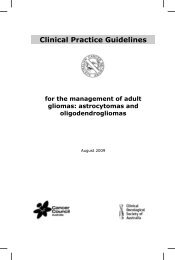Clinical Practice Guidelines for the management of locally advanced ...
Clinical Practice Guidelines for the management of locally advanced ...
Clinical Practice Guidelines for the management of locally advanced ...
You also want an ePaper? Increase the reach of your titles
YUMPU automatically turns print PDFs into web optimized ePapers that Google loves.
In<strong>for</strong>mal or family caregivers derived significant benefit from <strong>the</strong> involvement <strong>of</strong> palliative care<br />
services in terms <strong>of</strong> <strong>the</strong>ir satisfaction with <strong>the</strong> care delivered, improvement in communication and<br />
<strong>the</strong>ir own improved quality <strong>of</strong> life.<br />
Caregivers expressed increased satisfaction with quality <strong>of</strong> care. 8, 11, 13, 18-23 Hughes 8 reported an<br />
increase in satisfaction in relation to access to care and <strong>the</strong> technical quality, interpersonal elements<br />
and outcomes <strong>of</strong> care. Kane 11, 22 also found that carers reported better interaction with pr<strong>of</strong>essionals<br />
and greater satisfaction with <strong>the</strong>ir own involvement in care. Ringdal 20 and Jordhøy 18 identified<br />
caregiver satisfaction with <strong>the</strong> availability <strong>of</strong> doctors to <strong>the</strong> family. This study also identified<br />
significantly improved satisfaction with a number <strong>of</strong> aspects <strong>of</strong> <strong>the</strong> in<strong>for</strong>mation carers were given<br />
about <strong>the</strong> patient’s prognosis and progress. Increased satisfaction with communication was also<br />
identified by Hughes 8 and SUPPORT. 32<br />
Where 24-hour practical nursing care in <strong>the</strong> home (hospital in <strong>the</strong> home) was compared with usual<br />
home care by a GP and district nurse 15 , significantly more unmet need <strong>for</strong> night nursing support and<br />
<strong>for</strong> support <strong>for</strong> <strong>the</strong> carer in looking after <strong>the</strong> patient was identified in <strong>the</strong> control group. A study on <strong>the</strong><br />
impact <strong>of</strong> an intervention in caregivers’ coping skills showed a reduction in both task burden and <strong>the</strong><br />
burden <strong>of</strong> <strong>the</strong> patients’ symptoms <strong>for</strong> carers. 10<br />
However in one study 13 , caregiver morale was lower in carers whose relative survived more than 30<br />
days after discharge from hospital. This may reflect <strong>the</strong> continuing burden <strong>of</strong> caring when <strong>the</strong><br />
expectation was <strong>for</strong> a short terminal illness.<br />
A significant finding was an improvement in carers’ overall quality <strong>of</strong> life 8, 10 , with Hughes 8 finding<br />
improvement in several specific domains relating to quality <strong>of</strong> life, including physical function,<br />
physical and emotional aspects <strong>of</strong> role function, mental health and social function. Addington-Hall 17<br />
and Raftery 31 identified a decrease in caregiver expression <strong>of</strong> anger at <strong>the</strong> thought <strong>of</strong> <strong>the</strong> patient’s<br />
death.<br />
Provision <strong>of</strong> end-<strong>of</strong>-life care is a significant burden <strong>for</strong> in<strong>for</strong>mal caregivers. The evidence suggests<br />
this burden can be reduced through adequate provision <strong>of</strong> palliative care services, leading to improved<br />
outcomes <strong>for</strong> <strong>the</strong> family. This has <strong>the</strong> potential to have a major impact given <strong>the</strong> size <strong>of</strong> <strong>the</strong><br />
population.<br />
Palliative Care Question 3. In men with metastatic prostate cancer what is <strong>the</strong> evidence that<br />
specialist palliative care can assist patients and families in providing effective end <strong>of</strong> life care?<br />
Evidence summary Level References<br />
In men with metastatic prostate cancer <strong>the</strong>re is evidence that<br />
coordinated interdisciplinary palliative care can assist patients and<br />
families in providing effective end-<strong>of</strong>-life care, with more time spent<br />
out <strong>of</strong> hospital and reduction in <strong>the</strong> burden <strong>of</strong> providing care.<br />
Recommendation:<br />
II 8-13, 15-23,<br />
31, 32<br />
Men with metastatic prostate cancer and <strong>the</strong>ir families should be referred <strong>for</strong> a coordinated<br />
palliative approach to assist in providing effective end <strong>of</strong> life care.<br />
Grade C<br />
101<br />
Palliative care



